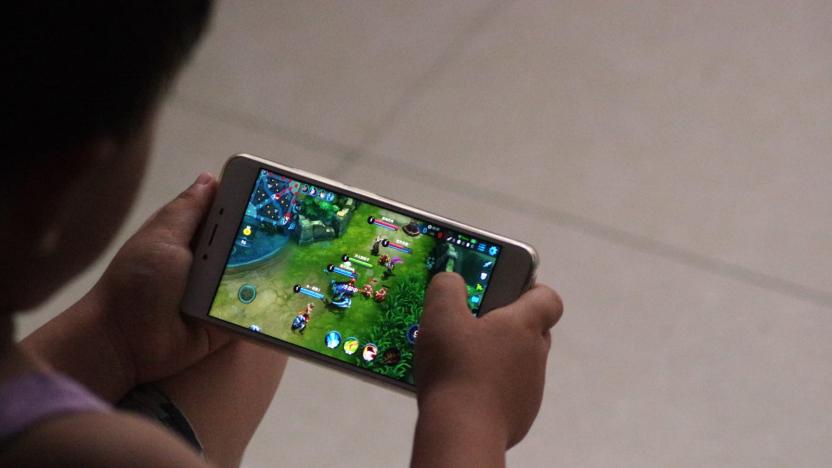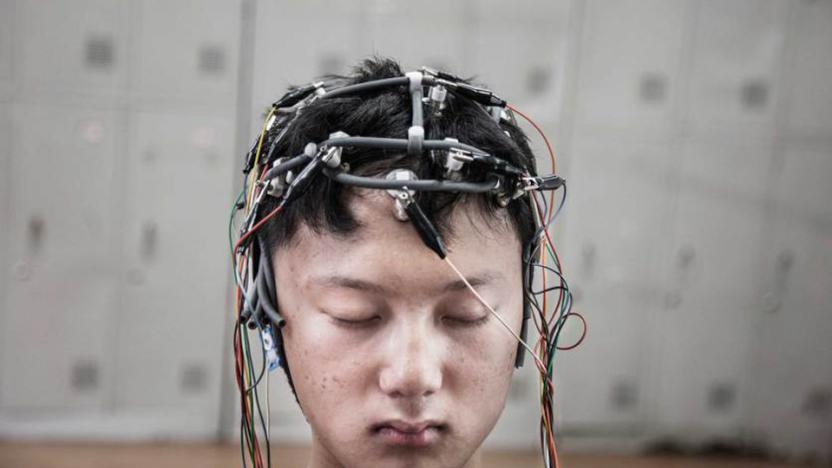gameaddiction
Latest

Tencent games will verify IDs to limit playing time for children
Chinese tech giant Tencent has imposed game time limits on younger players to curb addiction and promote healthy habits, but it's now taking some dramatic steps to enforce those restrictions. The company plans to verify the identities and ages of players to determine how long they're allowed to play. Tencent will check IDs through police databases and set the game time accordingly, giving the 12-and-under crowd one hour of play (and then only between 8AM and 9PM) while the 13-to-18 audience gets two hours.

The Big Picture: Monitoring the brains of online game addicts
Online game addiction is a real problem, and some countries are willing to take drastic measures to get these players living a healthier lifestyle. Need proof? Just look up. Photographer Fernando Moleres recently visited an internet gaming rehab camp in Beijing, and saw the facility monitoring the brain activity of addicts using the elaborate device you see above -- the camp wants to see that your mind is changing. The facility also relies on a mixture of medicine, military social structure and psychotherapy to set patients straight. It's hard to know if these "tough love" measures are truly effective, but their very existence reveals just how widespread compulsive gaming has become.

South Korea debates the wisdom of a video game addiction law
South Korea takes gaming more seriously than most other counties: eSports tournaments air on TV, game-friendly cafes are everywhere and StarCraft is practically a cultural institution. However, there's a concern that some are taking it too seriously, to the point that they're putting lives (including their own) at risk. To that end, the Democratic Party of Korea recently hosted a debate regarding a proposed game addiction law that would regulate video games as addictive substances, much like alcohol or drugs. The government, industry figures and professors discussed whether or not the law would fight addiction or risk backfiring.

University: Gaming addiction is real but over-diagnosed
Research at the U.K's University of Bolton says that gaming addiction may be over-diagnosed up to 10 percent of the time because indicators that were previously thought to relate to a gaming addiction had been borrowed from gambling addictions; what are the odds? Those markers may not translate between the two behavior patterns as well as previously thought. 10 percent doesn't sound like a major mistake -- unless you're in that group -- but the study balances some recent reports that hype and overstate the problem. (Oh Tyra, we thought you were better than the local news.) Still, the research stresses that gaming addictions are real.See also:Game addiction battled with silent soundDutch game addiction clinic is "swamped"Gamer addiction patient says he "peed in a bottle"Faux News investigates WoW addiction

Attention pro gamers: stop taking drugs
An interesting article on Tom's Hardware reveals that the Cyberathlete Professional League (CPL) is preparing to introduce drug testing at all of its gaming competitions next year. Ignoring the kneejerk observation that gaming can be a drug all on its own (we frequently test positive for Lumines), there are two ways of looking at this development. The CPL having to test for drugs sends an unfortunate message about gamers we've known for quite a while -- some of them just like to cheat. On the other hand, such serious measures imply that professional gaming (or, sigh, "eSports") is being treated in the same manner as "real" sports, with all the rules and repercussions that accompany them.The founder and president of the league, Angel Munoz, is clearly concerned about dubious drug activities in league events. "The potential for [drugs] being an issue absolutely concerns me. It should concern anybody in eSports, because as the stakes get larger, as in any sport, people will look for an edge." In case you were wondering, some of the chemical concoctions under consideration are crystal methamphetamine and Ritalin, both of which could be used to enhance mental alertness and twitch reflexes. Luckily, Munoz rules out the banning of Red Bull and the like, mostly because it would prove too difficult to regulate. He must also be astutely aware that gathering a large group of gamers (apologies -- cyberathletes) and robbing them of caffeinated beverages is an invitation to unmitigated disaster. [Via CVG]See also: LAN parties meet drug parties
